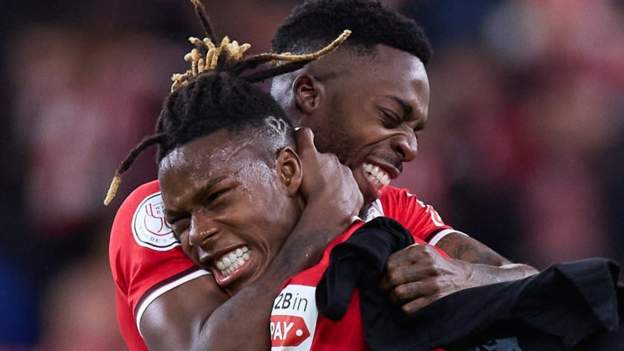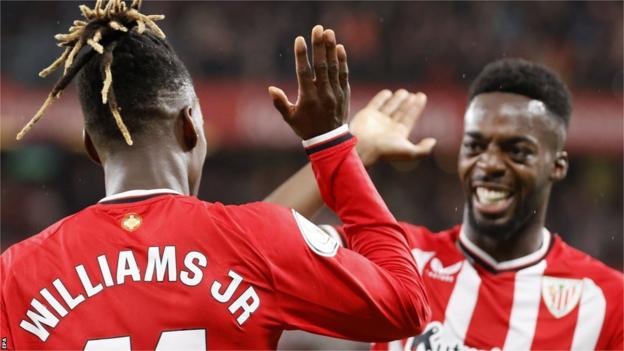
Sign up for notifications to the latest Insight features via the BBC Sport app and read the latest in the series here.
Inaki Williams always knew his brother Nico was special, even if his younger sibling used to get so nervous he would ask Inaki, already a star in Bilbao, not to watch his youth games at the Athletic Club academy.
Inaki is a pioneer.
He helped raise Nico while their parents worked tirelessly to make ends meet, but also paved the way for his brother and other sons of immigrants to represent a club whose policy of only fielding players born or raised in the Basque Country inevitably meant the squad has historically reflected the predominantly white society around it.
Inaki, 29, was not the first player of African heritage to represent the club – that was Jonas Ramalho, son of an Angolan father and Basque mother, in 2011 – but he is the first black player to establish himself at San Mames, having made more than 300 La Liga appearances, including an unprecedented 251 in a row.
Nico, eight years his junior, is, in Inaki’s words, now “making waves in football” too, and any nerves the youngster feels these days are channelled into realising childhood dreams of performing on the biggest stage alongside his big brother, mentor and guardian.
“As an older brother, it makes me really proud to see how he has grown, to see how he is improving as a footballer. He has no ceiling,” Inaki tells BBC Sport. “I’m here to help him, to teach him and give him everything he needs.”
It is a journey that began long ago, and a long way from Bilbao. Their mother, Maria, was pregnant with Inaki when she left Ghana with father Felix in search of a better life.
The couple crossed part of the Sahara barefoot. Inaki only learned the full extent of their story when he was 20. He had known his father had problems with the soles of his feet, but not that scorching sand was the reason why.
Felix and Maria made it to the Spanish territory of Melilla in north Africa, jumping a border fence, but were detained by the civil guard.
A lawyer advised them to lie, to say they were from war-torn Liberia instead and seek political asylum.
He arranged help in Bilbao from Catholic priest Inaki Mardones, who met the couple at Abando railway station when Maria was seven months pregnant, found them an apartment and took them to hospital for Inaki’s birth.
Mardones baptised the future star, even gave him his first football shirt, and became his godfather.
He is whom Inaki takes his name from.
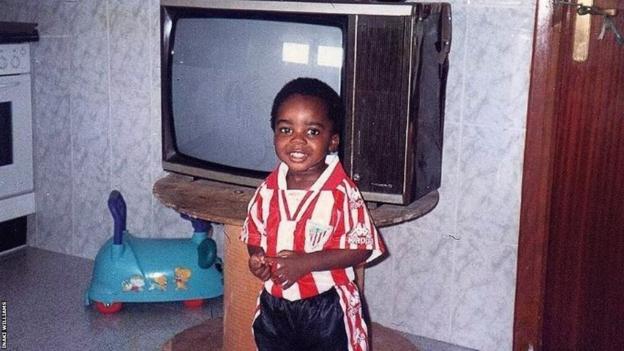
Not that settling in Spain made life easy for the family. They were given state housing in Pamplona and worked any jobs they could.
Felix moved to London in search of more opportunities, working the turnstiles at Chelsea’s Stamford Bridge, and Inaki – still a child – stepped in to help his mum raise Nico.
“We had to suffer a lot,” says Inaki, who would contribute to the family finances by refereeing football matches before his gift for the sport was enough to bring Felix home and end his search for work.
“Thanks to God we are all here together now, living a really good life. My parents are getting to watch their sons prosper, which is why they came here. Everything we do is for our parents.”
On Athletic’s radar for several years before officially joining the youth set-up aged 18, Inaki made his senior debut two years later in December 2014, sporting the same red and white jersey he wore as a boy.
“Inaki had a very difficult life when he was very young,” explains Athletic sporting director Mikel Gonzalez. “He knows what his responsibility is, so you can see him like a superhero. His mum is, for sure.”
Maria would always be there to watch her boys’ matches. Nico joined the academy aged 12, when Inaki was already breaking into the first team, and began to forge his own path to stardom.
“It was incredible watching him play,” says former Athletic head coach Gaizka Garitano. “So easy. He was very fast, incredible speed. Even more skilful than his older brother.
“Their mother was key for their improvement. Not only in football but also in the way they are, the respect of everybody. It was very tough for them, Inaki especially.
“Inaki lived this situation at home very hard, without any money.
“The character of Inaki is based on that time. He is very humble, always trying to learn from the coaches, and is very respectful.”
On Saturday the brothers will try to help Athletic win a first major trophy in 40 years when they face Mallorca in the Copa del Rey final in Seville.
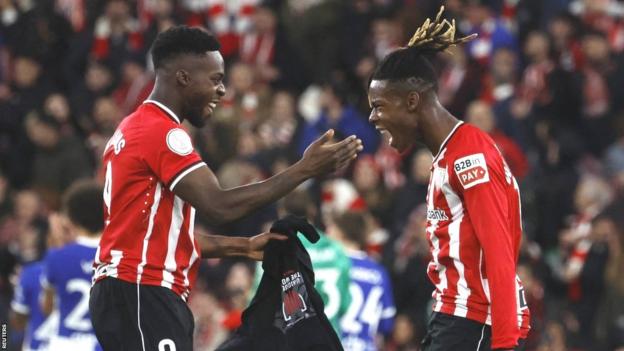
More than 100,000 fans are expected to make the trip by air, rail or eight-hour drive, most without tickets. If Athletic return with the trophy, the legend of the Williams brothers will be immortalised.
The club’s importance, especially in the Basque province of Bizkaia, is clear.
Athletic are an institution, visible in all aspects of daily life. Each baby born in the region in 2023 received a bib commemorating the club’s 125th anniversary. So vast is their youth network that they boast more than 160 partnership clubs and every football-playing boy at under-11s level trains at the club’s Lezama base at least once this season.
As sporting director Gonzalez puts it: “The first song you learn is the Athletic song. The first jersey you have is the jersey of Athletic. Your first time in a football stadium is always in San Mames.”
After a friendly appearance for Spain in 2016, Inaki chose instead to represent Ghana at international level. Nico meanwhile has committed fully to Spain, making four appearances at the Qatar 2022 World Cup. Both are also Basque.
Athletic are at the heart of that, providing Basque language lessons for all employees and celebrating Basque history and culture.
Even people without a general interest in football see the team as a vehicle for expressing their identity, a sense of belonging. “A religion,” one taxi driver calls it. He is at a wedding on Saturday but will join the bride and groom in front of the TV for kick-off at 10pm local time.
“Sometimes you find people who don’t really like football, but still they are Athletic fans,” explains midfielder Ander Herrera.
“That’s unique in the world. You see people who have been season ticket holders all their lives and they don’t watch other games; they only watch Athletic.
“In Bilbao, you find a woman who is 60 or 70 years old, she stops you in the street and she says to you that we have to win the cup and we have to qualify for the Champions League.”
Right now the city is decorated red and white. Flags hang from apartment windows, offices and council buildings. One metro station is decked out like San Mames, with a backdrop of fans looking over arrivals and departures.
Kids have been delivering letters to Athletic’s headquarters – the grand Ibaigane Palace – for players to open when they get to Seville.
At Bar Ledesma, where Pena Los Inakis, a fan club dedicated to the older Williams sibling, meet, you can eat Athletic crisps and sip club-branded beer.
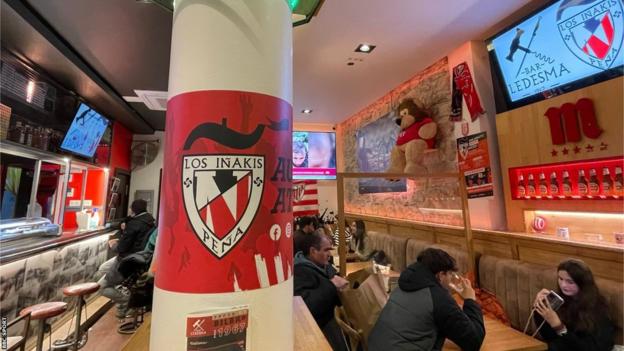
Near the stadium, in the heart of the city, banners flutter and even a mannequin in a wedding dress sports an Athletic scarf in a bridal shop window.
The club have been the bridesmaid too many times since their most recent Copa del Rey triumph in 1984.
Six final defeats, including two in as many weeks when the pandemic delayed a heartbreaking loss to rivals Real Sociedad, have followed.
There is a sense that, with Mallorca 15th in La Liga, this is Athletic’s best opportunity yet to end a long wait for major silverware.
The brothers, playing either side of the front three, have been fundamental in this cup run. Immediately after Ghana were knocked out of the Africa Cup of Nations, Inaki, flew back via Paris to arrive in Bilbao at 11am on the day of the quarter-final against Barcelona.
He came off the bench that evening to score in extra time before setting up Nico in a 4-2 victory.
Then, in the 3-0 semi-final second-leg win against Atletico Madrid, they assisted each other again. San Mames, ‘the Cathedral’, rejoiced.
“In terms of football, they are key,” says Herrera. “But on the personal side they are fantastic guys, always positive, always smiling.
“Even when they argue, which we have seen a few times, like a brother discussion, it is so funny for us and we love it.”
Just don’t mention La Gabarra.
In the successful 80s, when Athletic won back-to-back titles and the double in 1984, it became tradition for players to celebrate on a barge on the River Nervion.
Some believe talking about it since has become a jinx.
Pictures from those triumphs show a different Bilbao, an industrial city. Now it is an innovative hub of contemporary architecture with the Guggenheim museum, situated on the riverbank where a factory once stood, at the heart of its regeneration.
The football club reflects and embraces change, too. Throughout the youth system there are now players whose parents moved from Africa, South America or elsewhere. Midfielder Junior Bita, born in Ivory Coast, made the matchday squad last season. In the summer winger Alvaro Djalo will join from Braga. He is of Guinean descent and moved to Bizkaia as a baby.
“It was just part of the historical process of the country,” explains journalist Benat Gutierrez. “The Basque Country got a lot of immigrants before, but they were coming from other parts of Spain, therefore they were mainly white.
“African immigrants started coming in the late 80s, early 90s, probably the bigger influx in the 2000s, and it was just younger adult men who were not ready to start a sports career here.
“It has been a process until we are seeing…

